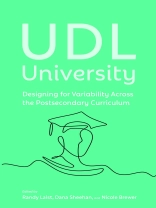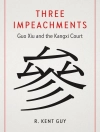In UDL University: Designing for Variability Across the Postsecondary Curriculum, sixteen Goodwin faculty members share their stories of ambitious experiments, inspirational successes, and instructive failures in applying Universal Design for Learning in their classrooms. Their compelling and highly personal accounts of UDL’s transformative effects span a variety of disciplines at the career-focused university-nursing, sociology, histology, computers, math, writing, literature welding, manufacturing, social justice, management, education, and more.
While the focus is on higher education, these stories provide educators at any level with practical illustrations of how to translate UDL theory into concrete lesson plans and curricular designs. They may also foster campus-wide conversations about teaching and learning, the variability of learners, and a new vision for more inclusive approach to education.
Allison Posey, a curriculum and design specialist at CAST who collaborates with educators from across the U.S. and internationally to implement Universal Design for Learning (UDL), provides the Foreword. She works in a wide range of settings, from kindergarten to higher education institutions to informal learning environments — with the ultimate goal that learning is intentionally designed to meet the needs of every individual in equitable, inclusive ways.
Contributors include: Amy Beauchemin, Annjanette Bennar, Keith A. Carter, Sandi Coyne-Gilbert, Michelle Dent, Phillip J. Fox, Kelli Goodkowsky, Lisa Coolidge Manley, Karrie Morin, Cynthia Murphy, Zachary Vincent Smith, Ellen Swider, Robin L. Young-Cournoyer
Содержание
Foreword by Allison Posey
About This Book
Introduction: Accessing Higher Education
Chapter 1: Making Connections in Teaching, Learning, and Life With Universal Design for Learning
Chapter 2: Curriculum Development at a UDL University: What Works, What Doesn’t
Chapter 3: Enhancing Engagement in the Technology Classroom With Nearpod
Chapter 4: Pecha Kucha : An Effective Tool for Teaching, Engaging Students, and Supporting Success
Chapter 5: Personalizing Communication: Using UDL Ideas to Breathe New Life Into Asynchronous Discussion Boards
Chapter 6: Practicing Social Justice and Becoming Agents of Change
Chapter 7: From Standard Operating Procedures to Universal Design for Learning: A Lifelong Learning Process
Chapter 8: Breaking Down the Introduction Paragraph With UDL Trickery
Chapter 9: Minimizing Threats and Distractions in a Peer Review
Chapter 10: Annotated? Overrated: Rethinking Research
Chapter 11: Badges and Paths: Creating Learner-Centered Environments in Online Classes
Chapter 12: Go-Karts and Arc Welders: Simulating Our Way to Success in a UDL-Informed Welding Class
Chapter 13: UDL and the Freedom to Fail: Technology, Games, Innovation, and Play
Chapter 14: It’s the Passion, It’s the Motivation-It’s the Goal
Chapter 15: Transforming Master’s Courses Through the Empowerment of Learners
Chapter 16: UDL and the Golden Ticket: Promoting Student Choice in Graduate Education
Afterword: The UDL Transformation
Further Reading
References
Index
Об авторе
Dana C. Sheehan is director of the Writing Center at Anna Maria College. Sheehan received her BFA in writing, literature, and publishing from Emerson College and her MFA in creative and professional writing from Western Connecticut State University. She has delivered UDL-infused presentations at conferences all around New England. Dana’s next UDL challenge will be about making discussion boards more inviting












